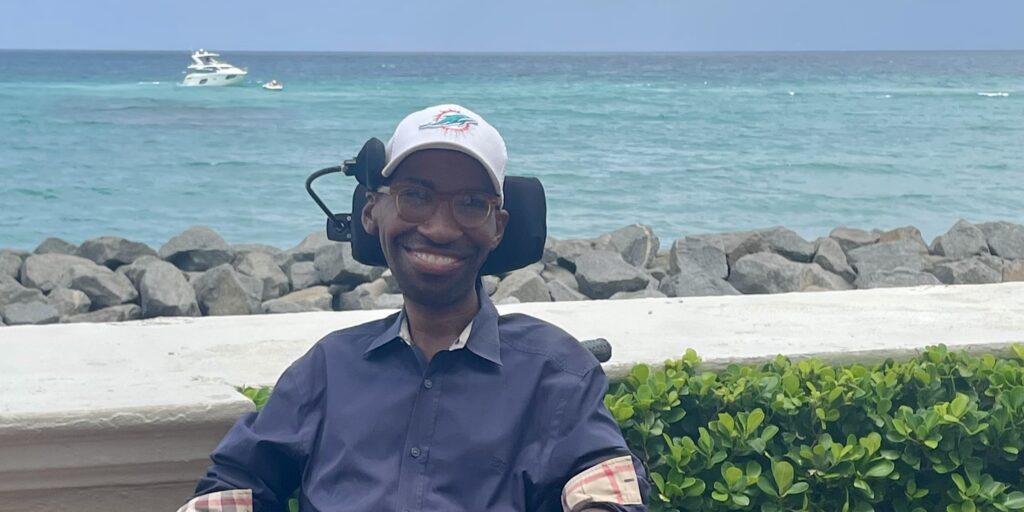
10 Tips for Finding Personal Care Attendants
By Lindsey Baker | Tuesday, November 10, 2020
Personal care attendants (PCAs) play a crucial role in helping people in the neuromuscular disease community day to day. Whether they’re assisting with activities of daily living or managing medical equipment, PCAs often make independent living possible.
But they can be hard to find. The first hire — or the second or third — might not feel like the right fit. Sometimes assistants choose to move on to different careers, or a trusted PCA moves to another city. The search can feel endless, and, at times, exhausting.
“Be prepared to fight,” says Mark Eisenberg, 27, a Westampton, N.J., resident who lives with Duchenne muscular dystrophy (DMD). “Be prepared to put in a lot of time and energy for research, phone calls, interviews, and sometimes total do-overs. Don’t let yourself get too discouraged if your first choice doesn’t work out. You’re not alone. It can often take several tries for even the best of us to find the right PCA.”
Mark and other MDA community members shared their best advice for those seeking PCAs — for the first time, or again.
Hiring privately
You may choose to pay an assistant out of pocket or use state-sponsored funding to hire a PCA outside of a home health agency (if your income level does allow for government assistance, you may be able to use it to reimburse a family member or friend for caregiving services). If you need assistance only for activities of daily living, hiring privately may be a more affordable option.
- First, crowd source. Ask your family members and friends whether anyone in their networks might be right for the job. Post about your search on Facebook — either in a public post on your feed or in a Facebook Marketplace advertisement — and place ads elsewhere, like Indeed.com or Care.com (where you can also find caregivers seeking positions). Mark suggests college students consider posting flyers on school or student disability services bulletin boards. Josh Cueter, 22, a recent college graduate from Troy, Mich., who lives with spinal muscular atrophy (SMA) type 3, also reaches out to college career services departments that can post job listings on their own job boards, plus university health sciences departments and student clubs that may have mailing lists. Josh reaches out to his regional MDA contacts, too, to connect with MDA Summer Camp counselors who may be looking for opportunities. And if you’re looking to replace a current caregiver, ask that PCA if they know any others they can recommend.
- Develop a multi-step interview process. “Start with a phone call interview just to ensure a person fully understands the position,” Mark says. While he follows up interviews with a meeting in a public place and then, finally, in his home where candidates can practice with any necessary medical equipment, follow-up interviews can be scheduled based on your level of comfort in the COVID-19 landscape. You may consider a first or second Zoom interview instead, so you can “meet” face to face. Discuss precautions necessary for anyone entering your home, including face masks and hand-washing routines, which could be practiced in an in-person, in-home meeting. Make sure you have an understanding of the person’s daily life and exposure risks when they’re outside your home.
- Be transparent about your needs and expectations. Mark recommends creating an application for each candidate to keep the process formalized, and to make sure you ask questions that are important to you. Ashleigh Peska, 31, a resource specialist in MDA’s National Resource Center who lives with limb-girdle muscular dystrophy (LGMD) type 2C, emphasizes laying out expectations in the interview process. How do you want PCAs to request time off or handle personal emergencies that will prevent them from working? If you have a team of PCAs, do you want them to communicate with each other before communicating with you? Ashleigh suggests clearly laying out a no-tolerance policy for no-show, no-call situations.
- Establish a tax-compliant payment structure. Care.com offers subscribers an option to pay assistants through the site (and, for what it’s worth, to run multiple background checks for a fee). A financial advisor or lawyer can also assist in determining tax rates and withholding based on the wage you and your PCA agree on.

[Image description: Two hands surrounding a red heart.]
Hiring through a home health agency
Home health agencies offer multiple types of aides — some who provide homemaking and companion services, and others who are able to help with bathing and medical needs. Agencies can also send multiple assistants to cover different shifts but maintain a single point of contact for you.
- Know what your insurance covers. Find your insurance provider’s directory, or contact the provider directly to learn what your options are. Your insurance company may provide a long-term care manager who can advise and update you on the approval process. Most insurance companies limit the number of hours they will cover for certain types of home care; make sure you know your allowances and make sure your agency does, too.
- Read the reviews. Ashleigh recommends utilizing CarePathways.com to locate agencies in your area; your insurance provider directory will also list your covered agencies. Customer and employee reviews of each agency can be illuminating, and help you narrow down options.
- Interview the agency. Just as with independent contractors, having a detailed conversation about needs and expectations is important to do with an agency, too. Ask agencies how many employees they have available and how many are looking for new assignments. Ask about the protocol in place for PCAs who call in sick or request time off — will your hours be covered by another aide so you don’t have a gap in assistance? Ensure you can request a different PCA if you receive one who’s not a good fit or who doesn’t understand your equipment.
Setting your own expectations
Finding a balance between the personal and the professional in PCA relationships can be intense. It takes trust and communication on both sides to set and adjust boundaries.
- Articulate your needs. You may outline your daily requirements during PCA interviews, but once you’re together, be clear about the details. If there’s a comfortable way for a PCA to move you while getting dressed or being transferred, let the PCA know. Be specific about your schedule, how long various activities or tasks take, and express that to your assistant so they can plan with you.
- Be flexible. “We all like things to be a certain way, but decide what is crucial and what is a want,” Ashleigh says. “Growing up, my mom was a hairdresser and my hair used to always look perfect. Well, not every PCA is a hairdresser. Learn to let go of the little things.”
- Be compassionate. “Ensure that you are ready to have hard conversations and be a manager with people you create close relationships with,” Ashleigh says, “but remember that your PCA is a person and has feelings and a life outside of you. Creating a friendship and professional bond of flexibility and understanding on both sides will be beneficial.”
For more information on finding PCAs and caregiver resources, contact MDA’s National Resource Center.
TAGS: Caregiving, Healthcare, Insurance, Personal Care Attendants, Resources
TYPE: Blog Post
Disclaimer: No content on this site should ever be used as a substitute for direct medical advice from your doctor or other qualified clinician.




